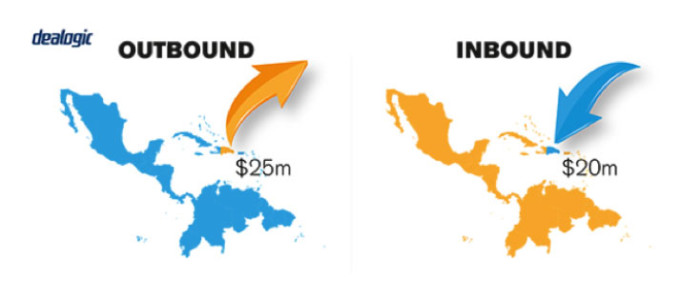
2015 Mergers and Acquisitions Report: Dominican Republic – Part 1
June 24, 2015
La empresa familiar y el gobierno corporativo
June 26, 2015Thania Gómez Muñoz, Paulo Alves and Harje Johannes Kjellberg of Proxies Law & Business assess the regulatory landscape for mergers and acquisitions in Dominican Republic
- DEAL PROTECTIONS
5.1 What are the main ways for a friendly bidder and target to protect a friendly deal from a hostile interloper?
Normally the parties execute a preliminary agreement, such as a memorandum of understanding, a letter of intent or a framework agreement, which includes the most important terms and conditions of the business between the parties, determines the process and actions between them and limits the access to information and negotiations with third parties and competitors.
5.2 To what extent are deal protections prevented, for example by restrictions on impediments to competing bidders, break fees or lock-up agreements?
There are no regulatory limitations to the free determination of the terms of the agreements between the parties.
- ANTITRUST/REGULATORY REVIEW
6.1 What are the antitrust notification thresholds in your jurisdiction?
In accordance with the applicable Dominican legislation, there are no antitrust notifications requirements. However, there is an antitrust authority and an antitrust law (Law 42-08).
6.2 When will transactions falling below those thresholds be investigated?
The antitrust authority may, on an ex-officio basis or by request of a legitimate interested party, begin an investigation and procedure to determine whether a transaction is in accordance with antitrust regulations or not.
The investigations initiated by the antitrust authority are public. Every transaction that is considered to have merits to be investigated will be published on the antitrust authority’s website.
6.3 Is an antitrust notification filing mandatory or voluntary?
Notification filling is voluntary.
6.4 What are the deadlines for filing, and what are the penalties for not filing?
There are no deadlines for filing; therefore, there are no penalties for not filing.
6.5 How long are the antitrust review periods?
The prescription period for any administrative or judicial measure that could be initiated in accordance with the antitrust law is for one year after the cessation of the anti-competitive conduct.
6.6 At what level does your antitrust authority have jurisdiction to review and impose penalties for failure to notify deals that do not have local competition effect?
There are no requirements to notify operations. However, the regulatory authorities may begin an investigation of the antitrust aspects of the operation; any legitimate interested party may also require the antitrust authorities to investigate a particular operation.
6.7 What other regulatory or related obstacles do bidders face, including national security or protected industry review, foreign ownership restrictions, employment regulation and other governmental regulation?
In general, the Dominican legal system does not discriminate against the free development of business, provided that such operations are not against the public order. In this regard, national and foreign persons and entities receive the same treatment.
Concerning labour matters, there are limitations to the ratio of national and foreign employees. In this regard, the basic rule is that 80% of the employees of a legal entity should be Dominicans. Nonetheless, said provisions do not apply to foreigners that perform managerial works.
In addition, regulated markets, such as security and weapons related industries, banking and insurance services, are subject to special regulations that will be reviewed on a case-by-case basis.
- ANTI-CORRUPTION REGIMES
7.1 What is the applicable anti-corruption legislation in your jurisdiction?
The Dominican anti-corruption legislation has a modern and diverse legal structure, which includes the following instruments: the law that establishes the Audit Chamber of the Dominican Republic (Law 10-04), the law on free access to public information (Law 200-04); the Procurement Law of the Dominican Republic (Law 340-06); and, the Bribery in Commerce and Investments Law (Law 448-06).
In addition, the executive branch has created several institutions to prosecute corruption, such as: the Committee on Public Ethics (Decree 149-98); the National Pursuit of Administrative Corruption (Decree 324-07); and, the Commission on Public Ethics and Anti-Corruption (Decree 101-05).
7.2 What are the potential sanctions and how stringently have they been enforced?
As provided by the legal framework indicated in 7.1, corruption and non-ethical acts by public officials are subject to criminal and civil sanctions, including limitations to the exercise of civil rights.
Besides said facts, the surveys and studies performed by international organisations such as Transparency International indicate that in the Dominican Republic, the levels of corruption are perceived to be high. In addition, it indicates that the persons that perform acts of corruption are not sanctioned.
- OTHER MATTERS
8.1 Are there any other material issues in your jurisdiction that might affect a public M&A transaction?
No, there are no special aspects that should be taken into consideration. Other than the standard provisions required for the implementation of due diligence, the regulatory environment and public opinion do not oppose or limit the success of M&A procedures in the country.
8.2 What are the key recent M&A developments in your jurisdiction?
There were very important M&A developments in the Dominican Republic in 2014.
In the telecommunications sector, the Luxembourg based telecommunications group Altice bought two significant Dominican Republic telecommunication companies (Orange and Tricom), and the process was concluded without regulatory difficulties.
In the banking sector, the second biggest private bank of the country, BHD Bank, merged with Banco León. The process was performed without regulatory difficulties.
In the energy sector, the most important acquisition in the Dominican Republic was made: the Dominican groups Estrella and Linda acquired a minority share in AES Dominicana, a subsidiary of the AES Corporation – one of the largest private investors in the electrical sector in the country – based on an equity or capital value of $1.2 billion. This operation became the first significant acquisition of a multinational company by a Dominican group.
Artículo completo:
![]() 2015 Mergers and Acquisitions Report: Dominican Republic
2015 Mergers and Acquisitions Report: Dominican Republic



